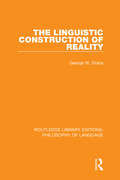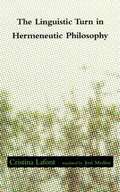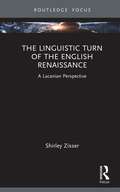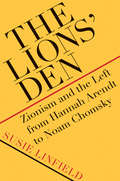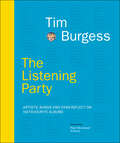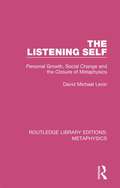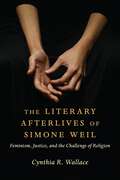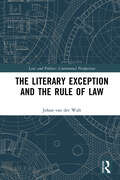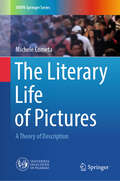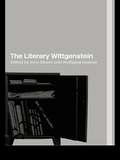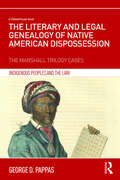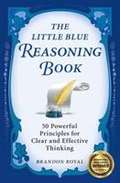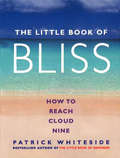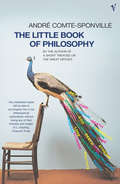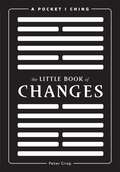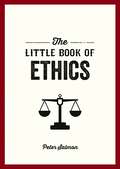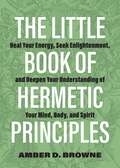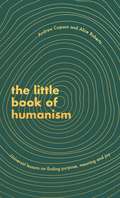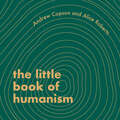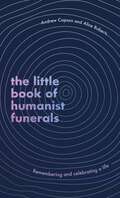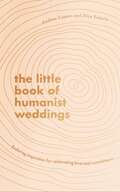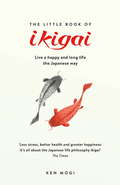- Table View
- List View
The Linguistic Construction of Reality
by George W. GraceThis book, originally published in 1987, considers how the science of linguistics creates its own objects of study. It argues that language is the one essential tool in the ‘social construction of reality’ – the way in which our environment as we perceive and respond to it is actually created by the cultural constructs we bring to bear on it – and that it is also the means by which this reality, once constructed, is preserved and transmitted from person to person and from generation to generation. Hence it is entirely appropriate to refer to the linguistic construction of reality.
The Linguistic Turn in Hermeneutic Philosophy
by Cristina Lafont José MedinaThe linguistic turn in German philosophy was initiated in the eighteenth century in the work of Johann Georg Hamann, Johann Gottfried von Herder, and Wilhelm von Humboldt. It was further developed in this century by Martin Heidegger, and Hans-Georg Gadamer extended its influence to contemporary philosophers such as Karl-Otto Apel and Habermas. This tradition focuses on the world-disclosing dimension of language, emphasizing its communicative over its cognitive function. Although this study is concerned primarily with the German tradition of linguistic philosophy, it is very much informed by the parallel linguistic turn in Anglo-American philosophy, especially the development of theories of direct reference. Cristina Lafont draws upon Hilary Putnam's work in particular to criticize the linguistic idealism and relativism of the German tradition, which she traces back to the assumption that meaning determines reference. Part I is a reconstruction of the linguistic turn in German philosophy from Hamann to Gadamer. Part II offers the deepest account to date of Habermas's approach to language. Part III shows how the shortcomings of German linguistic philosophy can be avoided by developing a consistent and more defensible version of Habermas' theory of communicative rationality.
The Linguistic Turn of the English Renaissance: A Lacanian Perspective (Routledge Focus on Mental Health)
by Shirley ZisserThe Linguistic Turn of the English Renaissance: A Lacanian Perspective examines a selection of cultural phenomena of the English Renaissance, all of which include a focus on language, from a Lacanian perspective. The book examines four inter-related cultural symptoms of the English Renaissance: the paucity of painting, the interest in rhetoric, the emergence of a literary style focusing on form and a fascination with the myth of Orpheus. The book argues that the English Renaissance, an apex of rhetorical theory, can offer psychoanalysis further knowledge concerning the intrication of language and flesh, especially where feminine jouissance is at stake. These language-centred phenomena emerge against the backdrop of a peculiar configuration of the visual field, which in contrast to other cultures of the European Renaissance is largely barren of painting other than portraiture. The book will be of interest to psychoanalysts, scholars of Renaissance culture and those interested in the psychoanalytic study of culture.
The Lions' Den: Zionism and the Left from Hannah Arendt to Noam Chomsky
by Susie LinfieldA lively intellectual history that explores how prominent midcentury public intellectuals approached Zionism and then the State of Israel itself and its conflicts with the Arab world In this lively intellectual history of the political Left, cultural critic Susie Linfield investigates how eight prominent twentieth-century intellectuals struggled with the philosophy of Zionism, and then with Israel and its conflicts with the Arab world. Constructed as a series of interrelated portraits that combine the personal and the political, the book includes philosophers, historians, journalists, and activists such as Hannah Arendt, Arthur Koestler, I. F. Stone, and Noam Chomsky. In their engagement with Zionism, these influential thinkers also wrestled with the twentieth century’s most crucial political dilemmas: socialism, nationalism, democracy, colonialism, terrorism, and anti-Semitism. In other words, in probing Zionism, they confronted the very nature of modernity and the often catastrophic histories of our time. By examining these leftist intellectuals, Linfield also seeks to understand how the contemporary Left has become focused on anti-Zionism and how Israel itself has moved rightward.
The Listening Party: Artists, Bands and Fans Reflect on 100 Favorite Albums
by Tim BurgessThe Charlatans&’ Tim Burgess invites you to the greatest listening party of all time. In 2020 when the world was forced to hit pause on live in-person gigs, Tim Burgess found an ingenious way to bring people together by inviting artists and bands, from Paul McCartney and New Order to Michael Kiwanuka and Kylie, to host real-time album playbacks via Twitter. Relive 100 of the most memorable listening parties here with stories from bands and fans, rarely seen backstage images, and unique insider info from those who created these iconic albums. "Hey Twitter, let's all say a big thanks to Tim for these brilliant events this year! We really needed them. So much great music being talked about.'" - Sir Paul McCartney "Twitter being used for something really positive." - Mary Beard
The Listening Self: Personal Growth, Social Change and the Closure of Metaphysics (Routledge Library Editions: Metaphysics #4)
by David Michael LevinOriginally published in 1989. In this interdisciplinary study, Dr Levin offers an account of personal growth and self-fulfilment based on the development of our capacity for listening. This book should be of interest to advanced students of critical theory, psychology, cultural studies, ethics, continental philosophy, ontology, metaphysics.
The Literary Afterlives of Simone Weil: Feminism, Justice, and the Challenge of Religion (Gender, Theory, and Religion)
by Cynthia R. WallaceThe French philosopher-mystic-activist Simone Weil (1909–1943) has drawn both passionate admiration and scornful dismissal since her early death and the posthumous publication of her writings. She has also provoked an extraordinary range of literary writing focused on not only her ideas but also her person: novels, nonfiction, and especially poetry. Given the challenges of Weil’s ethic of self-emptying attention, what accounts for her appeal, especially among women writers?This book tells the story of some of Weil’s most dedicated—and at points surprising—literary conversation partners, exploring why writers with varied political and religious commitments have found her thought and life so resonant. Cynthia R. Wallace considers authors who have devoted decades of attention to Weil, such as Adrienne Rich, Annie Dillard, and Mary Gordon, and who have written poetic sequences or book-length verse biographies of Weil, including Maggie Helwig, Stephanie Strickland, Kate Daniels, Sarah Klassen, Anne Carson, and Lorri Neilsen Glenn. She illuminates how writing to, of, and in the tradition of Weil has helped these writers grapple with the linked harms and possibilities of religious belief, self-giving attention, and the kind of moral seriousness required by the ethical and political crises of late modernity. The first book to trace Weil’s influence on Anglophone literature, The Literary Afterlives of Simone Weil provides new ways to understand Weil’s legacy and why her provocative wisdom continues to challenge and inspire writers and readers.
The Literary Exception and the Rule of Law (Law and Politics)
by Johan Van Der WaltAddressing the influential analysis of law and literature, this book offers a new perspective on their relationship. The law and literature movement that has gained global prominence in the course of last decades of the twentieth and the first decades of the twenty-first centuries has provided the research and teaching of law with a considerable body of new and valuable knowledge and understanding. Most of the knowledge and insights generated by the movement concern either a thematic overlap between legal and literary discourses – suggesting they deal with the same moral concerns – or a rhetorical, semiotic or general linguistic comparability or ‘sameness’ between them – imputing to both the same or very similar narrative structures. The Literary Exception and the Rule of Law recognises the wealth of knowledge generated by this approach to the relationship between law and literature, and acknowledges its debt to this genre of scholarship. It nevertheless also proposes, on the basis of a number of revealing phenomenological inquiries, a different approach to law and literary studies: one that emphasises the irreducible difference between law and literature. It does so with the firm believe that a regard for the very different and indeed opposite discursive trajectories of legal and literary language allows for a more profound understanding of the unique and indeed separate roles that the discourses of law and literature generally play in the sustenance of relatively stable legal cultures. This important rethinking of the relationship between law and literature will appeal to scholars and students of legal theory, jurisprudence, philosophy, politics and literary theory.
The Literary Life of Pictures: A Theory of Description (UNIPA Springer Series)
by Michele CometaThis book offers a theory of ekphrasis—the literary description of an artwork—from the perspective of Visual Culture studies. A theory of ekphrasis must take into account not only the rhetorical strategies articulated in the description of artworks, but also the complex interplay that holds together the pictures that are described, the gazes that rest on them, and the dispositives that mediate them. It is therefore a matter of linking the study of the verbal rhetoric with the dynamics that are established between the author, the reader, and the visual artworks, real or fictive, as well as the performative aspects of description and the mediascapes that, from time to time, condition the gaze and the visual experience of the authors and the readers. This book proposes thus to consider both the intradiegetic aspects of description and the extradiegetic ones that condition its verbal texture. Following the rhetorics of ekphrasis throughout the Western tradition, from its origins in Philostratus, its reappraisal by Johann Joachim Winckelmann, to the twentieth-century avant-garde, this book shows how ekphrastic techniques are historically determined by the relationship between pictures, gazes, and dispositives.
The Literary Wittgenstein
by John Gibson Wolfgang HuemerThe Literary Wittgenstein is a stellar collection of articles relating the philosophy of Ludwig Wittgenstein (1889-1951) to core problems in the theory and philosophy of literature. Amid growing recognition that Wittgenstein's philosophy has important implications for literary studies, this book brings together twenty-one articles by the most prominent figures in the field. Eighteen of the articles are published here for the first time.The Literary Wittgenstein applies the approach of Wittgenstein to core areas of literary theory, including poetry, deconstruction, the ethical value of literature, and the nature and logic of fictional discourse. The literary dimension of Wittgenstein's own writings is also explored, such as the authorial strategy of the Tractatus, and writing and method in the Philosophical Investigations. Major literary figures discussed in the book include William Faulkner, Joseph Conrad, and Friedrich Hölderlin.By mapping out the foundations of a new approach to literature, The Literary Wittgenstein is essential reading for anyone interested in the relevance and application of Wittgenstein's thought to literary theory, aesthetics, and the philosophy of language and logic.
The Literary and Legal Genealogy of Native American Dispossession: The Marshall Trilogy Cases (Indigenous Peoples and the Law)
by George D PappasThe Literary and Legal Genealogy of Native American Dispossession offers a unique interpretation of how literary and public discourses influenced three U.S. Supreme Court Rulings written by Chief Justice John Marshall with respect to Native Americans. These cases, Johnson v. M’Intosh (1823), Cherokee Nation v. Georgia (1831) and Worcester v. Georgia (1832), collectively known as the Marshall Trilogy, have formed the legal basis for the dispossession of indigenous populations throughout the Commonwealth. The Trilogy cases are usually approached as ‘pure’ legal judgments. This book maintains, however, that it was the literary and public discourses from the early sixteenth through to the early nineteenth centuries that established a discursive tradition which, in part, transformed the American Indians from owners to ‘mere occupants’ of their land. Exploring the literary genesis of Marshall’s judgments, George Pappas draws on the work of Michel Foucault, Edward Said and Homi Bhabha, to analyse how these formative U.S. Supreme Court rulings blurred the distinction between literature and law.
The Little Blue Reasoning Book: 50 Powerful Principles for Clear and Effective Thinking
by Brandon RoyalThis guidebook addresses one of the most critical yet seldom taught skills. Reasoning skills help us make sense of the world, including how to better make decisions, tackle opportunities, evaluate claims, and solve problems. Interwoven within the book's five sections -- Perception & Mindset, Decision Making, Creative Thinking, Analyzing Arguments, and Mastering Logic -- reader's will discover 50 reasoning tips that summarize the common themes behind classic reasoning problems and situations. Appendixes contain summaries of fallacious reasoning, analogies, trade-offs, and a review of critical reading skills. A wealth of examples, charts, and insightful problems makes The Little Blue Reasoning Book an invaluable guide for any individual wanting to further sharpen his or her thinking skills.
The Little Book Of Bliss
by Patrick WhitesideHow would you like to be blissfully happy? Would you like a direct line to Cloud Nine?This pocket-sized volume is written by the author of the bestselling Little Book of Happiness - a trained psychiatrist with an understanding of Eastern wisdom. Full of practical tips and a zen-like simplicity, it contains all you need to know to get your life on track.
The Little Book Of Philosophy
by Andre Comte-SponvilleIn this remarkable little book, Andre Comte-Sponville introduces the reader to the western philosophical tradition in a series of sparkling chapters on the 'big questions'. In doing so he reveals the essential bones of philosophical thought and shows why philosophy is relevant in our day-to-day lives. In his brilliant and concise writing on morality, politics, love, death, knowledge, freedom, God, atheism, art, time, Man, and wisdom, he inspires the central question of philosophy - how should we live? - and provides the reader with signposts towards a happier, wiser life.
The Little Book of Changes: A Pocket I-Ching
by Peter CrispA Simon & Schuster eBook. Simon & Schuster has a great book for every reader.
The Little Book of Ethics: An Introduction to the Key Principles and Theories You Need to Know
by Peter SalmonThis accessible and thought-provoking guide will take you on a captivating exploration of the fundamental questions that form our decisions and actions, asking, what is the right thing to do in a certain set of circumstances? What can we base our decision on? Is there always a correct decision, or is it always a bit unclear?
The Little Book of Hermetic Principles: Heal Your Energy, Seek Enlightenment, and Deepen Your Understanding of Your Mind, Body, and Spirit
by Amber D BrowneDiscover how the wisdom and philosophy of Hermes Trismegistus and Hermeticism can be applied to modern life in this beginner-friendly guide to the Hermetic principles.Hermes Trismegistus is believed to be one of the founders of philosophy, and his teachings can be connected to Stoicism, Platonism, esotericism, the Enlightenment, and more. The Little Book of Hermetic Principles delves into seven fundamental truths attributed to Hermes and teaches readers how to incorporate these principles into their own life, including: -The Principle of Mentalism and the power of the mind -The Principle of Correspondence: as above, so below -The Principle of Vibration and the power of energy -And more from The Kybalion. Perfect for beginners, this little book breaks down timeless wisdom into easily consumable chapters, and gives actionable tips on how to change one&’s own life for the better according to the various Hermetic principles. With overviews of The Corpus Hermeticum, The Emerald Tablet, The Divine Pymander, and more, readers will be able to gain perspective on Hermetic teachings beyond the seven principles. Plus, sections on astrology, magic, and alchemy will explore Hermes&’ more mystical teachings. This the definitive guide for anyone interested in learning more about Hermeticism and its applications in modern life.
The Little Book of Humanism: Universal lessons on finding purpose, meaning and joy
by Andrew Copson Alice RobertsTHE SUNDAY TIMES BESTSELLERWe all want to lead a happy life. Traditionally, when in need of guidance, comfort or inspiration, many people turn to religion. But there has been another way to learn how to live well - the humanist way - and in today's more secular world, it is more relevant than ever.In THE LITTLE BOOK OF HUMANISM, Alice Roberts and Andrew Copson share over two thousand years of humanist wisdom through an uplifting collection of stories, quotes and meditations on how to live an ethical and fulfilling life, grounded in reason and humanity.With universal insights and beautiful original illustrations, THE LITTLE BOOK OF HUMANISM is a perfect introduction to and a timeless anthology of humanist thought from some of history and today's greatest thinkers.
The Little Book of Humanism: Universal lessons on finding purpose, meaning and joy
by Andrew Copson Alice RobertsTHE SUNDAY TIMES BESTSELLERWe all want to lead a happy life. Traditionally, when in need of guidance, comfort or inspiration, many people turn to religion. But there has been another way to learn how to live well - the humanist way - and in today's more secular world, it is more relevant than ever.In THE LITTLE BOOK OF HUMANISM, Alice Roberts and Andrew Copson share over two thousand years of humanist wisdom through an uplifting collection of stories, quotes and meditations on how to live an ethical and fulfilling life, grounded in reason and humanity.With universal insights and beautiful original illustrations, THE LITTLE BOOK OF HUMANISM is a perfect introduction to and a timeless anthology of humanist thought from some of history and today's greatest thinkers.
The Little Book of Humanism: Universal lessons on finding purpose, meaning and joy
by Andrew Copson Alice RobertsTHE SUNDAY TIMES BESTSELLERWe all want to lead a happy life. Traditionally, when in need of guidance, comfort or inspiration, many people turn to religion. But there has been another way to learn how to live well - the humanist way - and in today's more secular world, it is more relevant than ever.In THE LITTLE BOOK OF HUMANISM, Alice Roberts and Andrew Copson share over two thousand years of humanist wisdom through an uplifting collection of stories, quotes and meditations on how to live an ethical and fulfilling life, grounded in reason and humanity.With universal insights and beautiful original illustrations, THE LITTLE BOOK OF HUMANISM is a perfect introduction to and a timeless anthology of humanist thought from some of history and today's greatest thinkers.
The Little Book of Humanist Funerals: Remembering and celebrating a life
by Andrew Copson Alice RobertsFrom the Sunday Times bestselling authors of THE LITTLE BOOK OF HUMANISMA humanist funeral allows us the freedom to remember and celebrate the life of someone in exactly the way we want to and - as the most popular alternative to a religious ceremony - put us more closely in touch with the precious nature of life.In a beautiful collection of insights from humanist celebrants, as well as quotes, poems and meditations from humanist writers and thinkers throughout history, THE LITTLE BOOK OF HUMANIST FUNERALS is the perfect introduction to the humanist approach to life and death.
The Little Book of Humanist Funerals: Remembering and celebrating a life
by Andrew Copson Alice RobertsFrom the Sunday Times bestselling authors of THE LITTLE BOOK OF HUMANISMA humanist funeral allows us the freedom to remember and celebrate the life of someone in exactly the way we want to and - as the most popular alternative to a religious ceremony - put us more closely in touch with the precious nature of life.In a beautiful collection of insights from humanist celebrants, as well as quotes, poems and meditations from humanist writers and thinkers throughout history, THE LITTLE BOOK OF HUMANIST FUNERALS is the perfect introduction to the humanist approach to life and death.
The Little Book of Humanist Weddings: Enduring inspiration for celebrating love and commitment
by Andrew Copson Alice RobertsFrom the authors of the Sunday Times bestseller The Little Book of HumanismA humanist wedding ceremony allows couples the freedom to express their love in a completely personal way - and choose what marriage means to them.In a beautiful collection of insights from humanist celebrants, plus quotes, poems and meditations from humanist writers and thinkers throughout history, The Little Book of Humanist Weddings is filled with inspiration to complement your unique celebration of love and commitment.
The Little Book of Humanist Weddings: Enduring inspiration for celebrating love and commitment
by Andrew Copson Alice RobertsFrom the authors of the Sunday Times bestseller The Little Book of HumanismA humanist wedding ceremony allows couples the freedom to express their love in a completely personal way - and choose what marriage means to them.In a beautiful collection of insights from humanist celebrants, plus quotes, poems and meditations from humanist writers and thinkers throughout history, The Little Book of Humanist Weddings is filled with inspiration to complement your unique celebration of love and commitment.
The Little Book of Ikigai: The secret Japanese way to live a happy and long life
by Ken MogiAS HEARD ON THE STEVE WRIGHT SHOW'FORGET HYGGE. IT'S ALL ABOUT IKIGAI (THAT'S JAPANESE FOR A HAPPY LIFE)' The TimesFind out how to live a long and happy life thanks to the ikigai miracle, a Japanese philosophy that helps you find fulfilment, joy and mindfulness in everything you do.It is extraordinary that Japanese men's longevity ranks 4th in the world, while Japanese women's ranks 2nd. But perhaps this comes as no surprise when you know that the Japanese understanding of ikigai is embedded in their daily life and in absolutely everything that they do. In their professional careers, in their relationships with family members, in the hobbies they cultivate so meticulously. Ken Mogi identifies five key pillars to ikigai:Pillar 1: Starting smallPillar 2: Releasing yourselfPillar 3:Harmony and sustainabilityPillar 4:The joy of little thingsPillar 5:Being in the here and nowThe Japanese talk about ikigai as 'a reason to get up in the morning'. It is something that keeps one's enthusiasm for life going, whether you are a cleaner of the famous Shinkansen bullet train, the mother of a newborn child or a Michelin-starred sushi chef. The Five Pillars at the heart of everything they do.But how do you find your own ikigai? How does ikigai contribute to happiness? Neuroscientist and bestselling Japanese writer Ken Mogi provides an absorbing insight into this way of life, incorporating scientific research and first-hand experience, and providing a colourful narrative of Japanese culture and history along the way.
